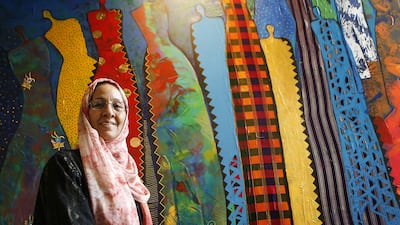‘Women always give,” says Najat Makki, a pioneer of the UAE’s contemporary art scene. “They feel pain but they don’t complain. They care for children ahead of themselves and they carry great responsibility in caring for the whole family.”
Makki expressed this belief in her recent work Illuminant Figures, which was reproduced, enlarged and displayed on the front of a building in Dubai's Al Barsha. Using bright reds and oranges, she depicted tall women wearing traditional dress from about 70 years ago.
“I wanted to put the women high to show they’re strong, like tall palm trees,” she says.
Makki incorporated fabrics she feels are important to women, such as silk, cotton, satin and lace. It was then displayed in the Dubai Women’s Museum, where it was chosen to feature in the outdoor exhibition.
The piece is one of thousands Makki has created during her career. In 1977, she became the first Emirati woman to earn a government scholarship to study art abroad. She has a degree and master’s from the College of Fine Arts in Cairo, plus a doctorate in the philosophy of art. She has since exhibited her work across the Middle East and Europe.
“I grew up in Dubai next to the sea,” she says. “Every day it was different. Sometimes it was dark blue, sometimes it was light, sometimes rough and sometimes quiet. This constant change gave me ideas. It inspired me.”
As a child, much to her mother’s consternation, Makki used to scratch and paint on the walls of the family home. After being chastised, she was given paper and art materials instead.
Her father ran a herbal medicine shop. “I used to go with him and I was fascinated by the colours and textures of the products,” she says. “I used to paint with them on paper. They gave me ideas and so I made pictures, often of the sea.”
At school, Makki’s teachers recognised her talents. “They really pushed me. They talked to me, encouraged me and gave me so much energy. They steered me towards my scholarship, which was not easy for a woman at that time,” she recalls.
Having been at the forefront of the Emirati art scene for 40 years, Makki believes exhibiting in public spaces is important.
“Art opens the mind. It inspires people and it sparks imaginations. Displaying pieces in open spaces, be they shopping malls, offices or parks, also helps the art community. Artists need different people to see their work. They need the exposure. Not everyone visits art galleries,” she says.
Makki cites the Sharjah Art Museum as especially important to the development of the local art scene, and encourages people to visit to view works by leading European and Emirati artists.
“The whole world is surprised at what the UAE art community has achieved and how it will continue to grow with giant paintings like mine on the side of buildings,” she says.
She says that local initiatives encouraging art among children have been particularly effective. An annual competition, run by Sheikha Latifa bint Mohammed bin Rashid, for example, recognises talented young artists.
What advice does Makki offer these aspiring artists?
“Be patient,” she says. “Young artists want success quickly, but art comes step by step. If you want quality, you need to rest and think. You need to read and visit exhibitions. Take the time to talk to other artists and accept that success comes bit by bit.”
This has certainly been the case for Makki who has developed steadily during her four decades as an artist, exhibiting at more and more international art fairs and becoming a member of the Dubai Cultural Council. She has plenty of future plans, too.
“Soon I will display my works in Doha,” she says. “Later in the year, I will also exhibit in Beijing and at the One&Only Royal Mirage in Dubai.
“I hope the arts scene in the UAE continues to grow. Art is like a smile. It brings happiness to our lives.”
≤Who is your favourite artist?
The Emirati artist Abdul Qader Al Rais. I like the strong colours he uses. His paintings are in some of the world’s big museums and he’s very important to the UAE art scene. He’s the best Arab artist, in my opinion, using many different mediums to create landscapes and abstract pictures.
If you could take your family anywhere in the world, where would you go?
Paris. I love it. Anytime you want to find art, you can find it in the street, in cafes, museums, libraries, shops. If you see fashion, you see art. It’s a wonderful city.
Which of your own paintings is your favourite?
The Sea, because it’s very deep. You see water, fish, pearls, animals, birds and much more. It contains so many colours. It relaxes me.
Where do you most like to paint?
In my studio at home. My whole house is a studio.
What’s your favourite food?
Salmon. It’s delicious and looks beautiful, too – grilled or in any form. Sometimes, I make it at home, but my favourite place to eat it is in Italy or France.
What’s your favourite painting?
Anything by Salvador Dalí. I have been buying his signed prints for 25 years. I love surrealism and want to see nature and deep into the body.
What’s your favourite place in the UAE and why?
My father’s home in Bur Dubai, close to the sea. It’s where I was born.
Is your glass half-empty or half-full?
Neither. Medium is good.
weekend@thenational.ae

